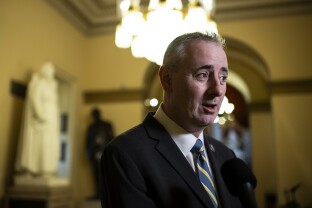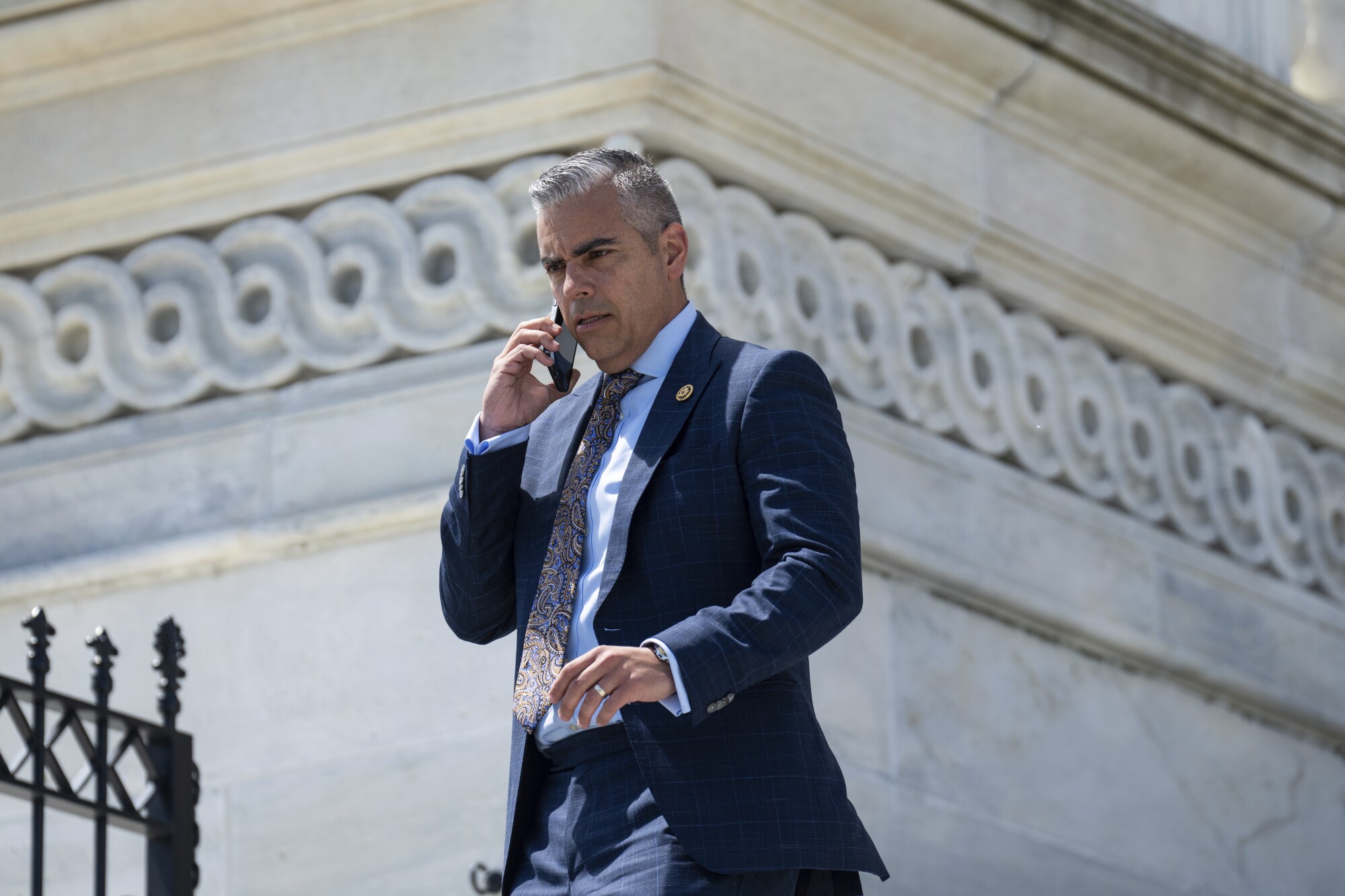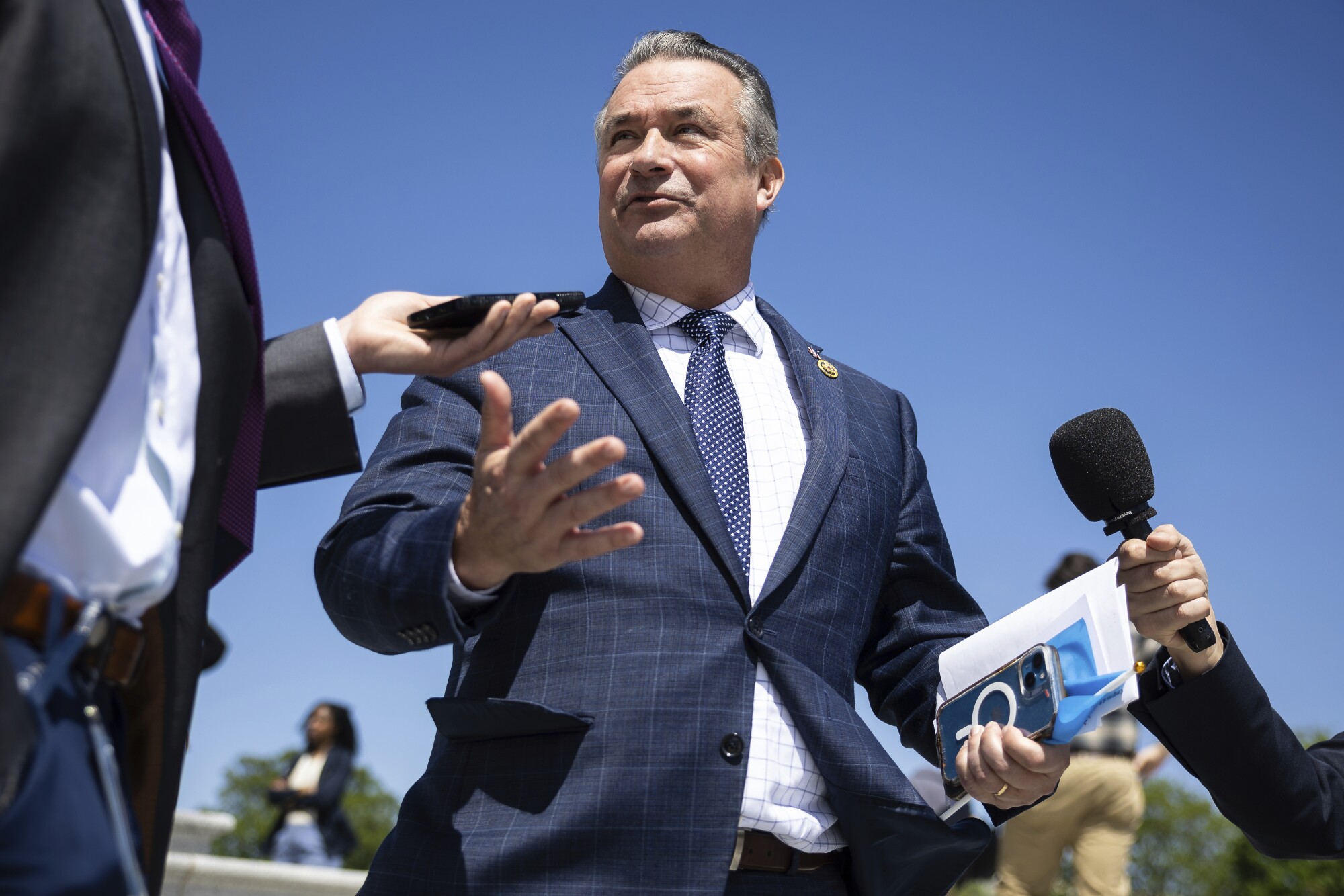Speaker Mike Johnson is staring down the slimmest House Republican majority in U.S. history, setting him up for a tenuous hold on his position and the challenging task of being the country’s highest-stakes people pleaser.
While conservatives in the Freedom Caucus have made it known that they plan to be a constant challenge for the speaker, there’s also a quieter corner of the GOP conference that Johnson will have to satisfy: moderates.
“It’s a new year,” Rep. Juan Ciscomani told NOTUS. “New energy.”
The most prominent organization for House centrists, the bipartisan Problem Solvers Caucus, met on Thursday for the first time in over a year. And though the group is not entirely moderate — there are a few Freedom Caucus members who actually double dip — the Problem Solvers Caucus is a rare group that at least attempts to reach across the aisle.
Once known as a bulwark against Trump-fueled polarization and legislative gridlock, the caucus’s public voice softened to little more than a whisper last term, with smaller groups — like New Yorkers focused on the state and local tax deduction — more often being louder than the Problem Solvers Caucus.
“We had a chance to be a stronger voice this whole year,” Problem Solvers Caucus Whip Rep. Don Bacon told NOTUS. “And I feel like it was a lost opportunity.”
But next term, moderates are already realizing they’ll have to speak up.
With a GOP trifecta, the pressure from Donald Trump and other Republicans to secure conservative policy victories will be constant. Far-right members have already signaled that they want to make major advancements in areas like immigration, border security and abortion.
In those situations, it could be the Problem Solvers Caucus which stands in the GOP’s way.
Problem Solvers Caucus Chair Rep. Brian Fitzpatrick told NOTUS that his group has already played a role behind the scenes in crafting Republican policies. He thinks that will continue next year.
“We’ve been working on legislation together the whole time,” Fitzpatrick told NOTUS, citing his collaboration with Democratic members like Reps. Marie Gluesenkamp Perez and Jared Golden.
Pressed on whether bipartisanship would be possible in an increasingly polarized atmosphere, the Pennsylvania Republican insisted — with spokesperson-like precision — that “everybody represents their own districts. All of us do.”
“Obviously, there’s a lot that bonds us together in terms of our viewpoints,” he added.
But take Fitzpatrick as an example. He represents the largest swing county, Bucks, in the swingiest state in the country, Pennsylvania. He spent the last cycle boasting his independent bona fides as a Republican in what was a Biden district. And after the 2024 election, Bucks County broke for Republicans for the first time in over three decades.
From a nakedly political perspective, that gives Fitzpatrick reason to be less, not more, bipartisan next term.
But with the House GOP margin thinner than ever, there’s also more leverage for moderates to maneuver. Part of that work will simply be blocking certain politically fraught items from coming to the House floor for votes. It will likely be on moderates to hold the line against the GOP’s most hard-line policies, like building a wall along the U.S.-Mexico border and drastically limiting abortion. Republican members of the Problem Solvers Caucus know that much of their work, if they’re successful, will be done behind the scenes.
As Bacon put it, just because Republican moderates have been less publicly vocal on legislation than their hard-right counterparts doesn’t mean they haven’t exerted influence.
“My job is to fix bills before they come on the floor with a majority,” Bacon said, citing successful negotiations on some appropriations bills he initially “hated.”
Democratic co-Chair Rep. Josh Gottheimer also told Politico that the caucus was “very involved” in debt ceiling negotiations, appropriations bills and foreign aid. Gottheimer said the group has even larger aspirations to get more involved next year.
With a one-vote margin, Johnson has no room to maneuver on Republican-only bills. He will likely have to rely on Democratic votes to accomplish much of anything. (Trying to pass Republican bills with a slim margin in this Congress has largely been a fool’s errand.)
But with that GOP trifecta, Republicans are also loath to admit that they’ll have to work with Democrats — particularly Republican leaders.
In that scenario, it may fall on moderates to demonstrate that GOP leaders have no choice but to consult with Democrats and pass legislation on a bipartisan basis. And if Republican leaders push ahead with hard-line bills, it may also fall on moderates to vote them down.
If and when Johnson has to reach across the aisle, Republicans in the Problem Solvers Caucus made the case to NOTUS that they are best positioned to facilitate negotiations. They have a literal seat at the so-called “five families” table — a gathering of the most prominent groups in the House GOP: the Problem Solvers Caucus, the Freedom Caucus, the Republican Study Committee, the Republican Main Street Caucus and the Republican Governance Group.
“The objective is to find those areas where we can do that and work together,” Rep. Mike Lawler, another member of the caucus, told NOTUS. “This is a very narrow majority that will require compromise, and sometimes there will be opportunities for Problem Solvers members to play a role.”
But Bacon cautioned his Republican colleagues from overplaying their hand. “I think our mandate is not the sweeping, broad one that everybody says,” he told NOTUS.
There’s some truth to Bacon’s assessment.
While Republicans have a trifecta, they do not have a 60-vote threshold in the Senate to override the filibuster. That means Republicans will have to appease Democrats on at least some legislation if they want to pass anything beyond reconciliation bills.
Republicans have made no secret of their plans to maximize the budget reconciliation process, allowing the Senate GOP to override the filibuster. But those reconciliation bills will be the biggest leverage point for any House Republican. Just one GOP lawmaker could disrupt the rest of their party’s plans.
With that kind of power, the Problem Solvers Caucus knows it has an opportunity to exert influence — and leaders of the group are aware that some members in the caucus hardly belong.
Problem Solvers Vice Chair Rep. Nicole Malliotakis told NOTUS that part of the group’s meeting on Thursday was about instituting accountability measures to ensure that only moderate members are among their ranks. While she explained that the meeting was something of a “productive” idea-sharing session, she referenced using votes, co-sponsorships, attending conferences and writing op-eds with colleagues as “metrics for bipartisanship.”
“The idea is to root out the people who use the group simply for cover in their elections as opposed to truly wanting to work in a bipartisan fashion in a Republican trifecta,” Malliotakis said.
After all, operating with a collective voice will be important if the caucus wants to raise its profile and its relevance.
“We’ve been ineffective,” Bacon said of the Problem Solvers Caucus. “I hope that we can turn over a new leaf.”
At least one Republican caucus member told NOTUS they are optimistic that will be the case.
“The band is back together,” this lawmaker said.
—
Riley Rogerson is a reporter at NOTUS. Tinashe Chingarande and Casey Murray, who are NOTUS reporters and Allbritton Journalism Institute fellows, contributed to this report.
Sign in
Log into your free account with your email. Don’t have one?
Check your email for a one-time code.
We sent a 4-digit code to . Enter the pin to confirm your account.
New code will be available in 1:00
Let’s try this again.
We encountered an error with the passcode sent to . Please reenter your email.




